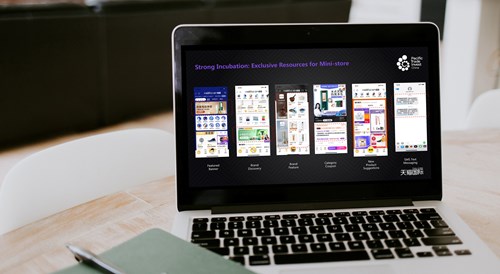As we journey further along the road to recovery, the ongoing impact of the COVID-19 pandemic remains a challenge for many, continuing to take a toll on communities and businesses across the Blue Pacific.
According to the results of the latest PTI Network Pacific Business Monitor - Recovery Series Q1 2022, the increasing costs of products/raw materials and poor cashflow remain two of the top challenges Pacific businesses are facing. In response to these challenges, Pacific Trade Invest China, under the theme of ‘Digitalisation 2022’, have been exploring avenues of opportunity for Pacific businesses on China’s major ecommerce platforms. Providing Pacific businesses access to these ecommerce platforms not only caters to enterprises who aspire to ‘go digital’ in their export strategy, but also allows unique access to China’s huge online market and booming digital economy.
In line with this, PTI China recently introduced Alibaba's Tmall Global Mini-Store to a number of Blue Pacific businesses earlier this year. The Mini-Store is a new platform under Tmall Global, the cross-border trading platform of China's largest ecommerce giant, Alibaba. It targets small and medium-sized new businesses, with core advantages including its strong incubation capability for new brands, direct access to Alibaba's ecosystem resources, low cost and market access, providing strong potential for Pacific businesses to tap into the US$900 million purchasing power of the Chinese domestic market.
Seizing the opportunity and platform compatibility with Pacific businesses, PTI China sent ‘Expressions of Interest’ (EOIs) to Investment Promotional Agencies (IPAs) and National Chambers of Commerce across six Pacific Island countries: Fiji, Samoa, Vanuatu, Cook Islands, Papua New Guinea and Tonga. The EOIs sought export-ready businesses with an export strategy for China, and specialty products with potential market interests such as a range of beverages, coconut products, coffee or skincare.
Initial feedback from Alibaba’s assessments of the EOIs received from Pacific businesses was that while some of the products of interest may appear to have lower market recognition, there was potential for the listing of fast-moving consumer goods (FMCG) on the platform, with further feedback provided on packaging and labelling requirements, trademark registration and packaging language translations.
“Technology and Connectivity is one of the thematic areas of the Blue Pacific 2050 strategy, and a greater understanding of the digital ecosystem helps us prepare our Pacific businesses in future to become not just export-ready but also China ready. This is also an alternative approach we have taken to support and guide our Pacific businesses recover from the negative impact of the pandemic,” says Mona Mato, Trade Commissioner of PTI China.
The digital economy and the opportunities for the Pacific was also highlighted by Secretary General Puna during his meeting with Chinese State Councillor and Foreign Minister Wang Yi in the margins of the Minister’s Pacific visit where they both discussed ecommerce industry cooperation and committed to working together to create new growth for the Blue Pacific.
PTI China is pleased to facilitate the presence of our qualified Pacific enterprises on the Mini-Store project and will continue to support our Pacific businesses to list their products on China’s largest online shopping platform.
For more information regarding exports to China please contact Yolanda Jiang, Export Manager, PTI China on yolanda.jiang@pacifictradeinvest.org.cn



